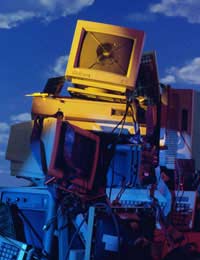Recycling Electronics

We are all involved in the revolution in consumer electronics, whether we have recently bought a new microwave, flat-screen television, or simply look with longing at the latest Apple Macintosh computer or IPod. There is now so much choice and range of appliances and gadgets, and so many different brands all competing for our spending power, that it is bewildering to think about it all. But what we as consumers so rarely consider is, what happens to the computer or walkman or HiFi unit that we discard when we want to upgrade and get the newer model?
Dealing with Electronics, or E-waste
As our love of and reliance upon these products has grown over the last 20 years, conversely the lifespan of the electronic equipment has shrunk. Discarded electronics have become the main category of waste at municipal waste disposal centres. It has expanded as a definable waste category three times faster than any other, i.e. much more than paper, metals, plastic or glass, and now makes up approximately 5 % of all worldwide municipal solid waste.This e-waste is clearly poison for the earth: lead, mercury and other toxic substances leach out of these machines. The solid lumps of plastic do not biodegrade in landfill dumps, and consume space.
Reusing and Recycling Computer Equipment
The average lifespan of computers in the Western world has dropped from an average of 6 years in 1997, to an average of 2 years in 2005. This rapid turnover has seen a massive increase in products flooding the market – 183 million computers were sold worldwide in 2004.When it comes to replace a computer, think carefully about what to do with the old model. There are various schemes and enterprises which will accept working computers and donate them to various projects in developing countries. Check to see if these operate in your area. Many schools and businesses are aware of them, or your local municipal recycling officer should be able to give advice. Even if the computer is not working anymore, there will be components within it that can be salvaged and reused.
A European Union directive in august 2005; the WEEED (Waste Electrical and Electronic Equipment Directive), brought into law across the EU the requirement for all producers to take responsibility for their discarded products, so in theory, the makers will accept their broken computers back.
Test this out, and request that they reuse and recycle as many of the components as possible.
Check to see if your local charity shops accept old computers and electronic goods – even if they aren't working, some of the larger charities now have regional workshops where they repair or strip down equipment.


Re: Recycling White Goods
I have my old refrigerator & dishwasher to be given away.
Re: Recycling White Goods
HI I am in need of a spider shaft for my Samsung front loader washing machine. Can anyone help me with one please I am on a disability…
Re: Recycling White Goods
I have an all drink frig and a dishwasher both domestic appliance both working need more space at home
Re: Rules Governing Use of Recycling Logo
I am so confused with recycling labels. Nothing seems standardised? Surely, it should be a case of 2 options Recycle…
Re: How to Recycle Our Office Telephones?
The Parish Council would like to donate the following phone system, if someone could come and collect it. Panasonic…
Re: How to Recycle Our Office Telephones?
We have Phones that we would like to recycle. Poly Phone models CX300 x 20 CX600 x 28 Cx700 x 2 Vvx600 x…
Re: More Environmentally Friendly to Use Glass Milk Bottles?
Why is it more expensive to wash and refill bottles for milk than using a new carton which is…
Re: More Environmentally Friendly to Use Glass Milk Bottles?
I would like to get free range milk in glass bottles, is this possible?
Re: More Environmentally Friendly to Use Glass Milk Bottles?
Do you have recycling experts to talk to? As I am creating new vegan skin care brand and the…
Re: More Environmentally Friendly to Use Glass Milk Bottles?
We have recently started having our milk delivered in glass bottles by a local dairy. At…